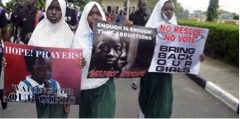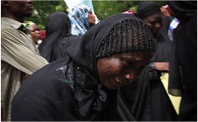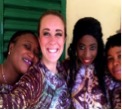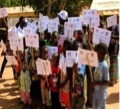

In 2015 the theme, ONE BILLION RISING REVOLUTION with the tagline DRUM, DANCE & RISE, is a call to focus on revolution and change as an escalation of our demand to end violence against women and girls once and for all.
In 2015, The West African region was faced with an unprecedented circumstance of an epidemic of Ebola a deadly virus that was very contagious and deadly. As a result it was noted that the engagements would be concentrated on the individual country initiatives as well as coming together and galvanizing our efforts to raise awareness on the cyber space. The Boko Haram campaign was #BringBackOurGirls! The region was also faced with the resurgence of religious fundamentalism and in the name of religion young girls and women were violated and abused. It saw the abduction of over two hundred girls from Northern Nigeria by the Boko Haram insurgents in a hideout where girls were subjected to sex slavery and abuse. As a result, the West Africa region was mainly engaged in sharing and making concerted efforts to call to accountability the state of Nigeria and the international community to protect those girls. Also, neighboring countries were occupied with containing the rebels from invading their frontiers. As indicated by the Human Rights Council thus:
“The atrocities committed by Boko Haram have had a critical impact on the human rights situation in Nigeria and at the borders with its neighboring countries in the Lake Chad Basin, namely Cameroon, Chad and Niger”, said UN Human Rights Chief Zeid.
“Countless more children, women and men have been abducted, abused and forcibly recruited, and women and girls have been targeted for particularly horrific abuse, including sexual enslavement,” Zeid added. “Villages and towns have been looted and destroyed… and [Boko Haram] attacks have destroyed or severely damaged at least 300 schools, killed numerous students, and ended with the abduction of hundreds of schoolgirls.”




In Sierra Leone, La Guinea and Liberia the Ebola epidemic took its toll on the population with thousands of women, men and children left dead. As a result a lot of the advocacy was focused on addressing Ebola and its resultant effects on the population. The population was restricted from moving and no one was allowed to travel to these countries as a result of the deadly and contagious nature of the problem.
Also discussions were centered on the gender dimensions of the Ebola crisis in the region and how this impacted on the lives of women and children. One Billion Rising was able to amplify this situation globally by the actions taken by the movement to galvanise support for the campaign around the Ebola and Boko Haram crisis.The One Billion Rising global movement galvanized a global call to end FGM which triggered a lot of reaction and support to protect the girls. Activists from all over the world responded to call thus bringing the issues to attention, which brought a lot of support to the countries affected.
As a result of the unfolding events and circumstances in the sub-region the coordinator of the sub-region sent a note to the activists informing them of the existing situation and urged them to engage in their various countries as well as in the cyber space.
The OBR Revolution regional events focused on the Ebola advocacy and in solidarity with our Nigerian sisters to condemn the violation of Women’s Rights in the Name of Religion using different forms of sexual violence such as FGM, early and forced marriages, rape amongst others.
The “One Billion Rising Revolution” started with the commemoration of the International Zero Tolerance Day on the 6th February 2015.
On the 14th February 2015, the sub-region joined the rest of the world in celebrating the event in the following ways:
Sierra Leone: The activists were engaged in discussions on violence against women in Port Loko, Freetown and other parts of the country. Kaddy Konteh shared information on the incidence of rape and the effects of Ebola, the reason why FGM has taken a halt because of the contagious nature of the disease.
Mali: A radio programme was run on the day with panel discussions on violence against women. The Family Code was an area of focus for the activists. People were mobilized to rise on the day and many people including the security forces were involved.
Senegal: Organisations celebrated the event by organizing discussions around the parity bill and women’s rights.
Nigeria: The focus was on the Boko Haram insurgence and the women’s rights movement was engaged in calling the state to free the girls and marching out using placards to express themselves. The campaign was held in different parts of the country and activists were constantly giving updates about progress. Women’s Rights Organisations in Nigeria and networks such were actively involved in sharing information to their various networks.
Guinea Bissau: The radio was used as advocacy tool to engage the public.
2015 has seen increase in number of people, organizations, and institution joining in the revolution, rising for justice and denouncing violence against women. Even in the rural areas grassroots activists were engaged to push forward their struggles which were taking place in quiet corners which were hardly brought to the attention of the world. One Billion Rising Revolution initiative has facilitated for grassroots activists to amplify the voices of the grassroots movement and connecting them to the rest of the world.
It is overwhelming to see how much effort was made by different countries to address VAW and the way the global was linked to the local and vice versa.
Also, the international community was forced to take a very effective stand to address the atrocities meted on women and the Human Rights Council was really engaged with the continent to move the process further. All these gains were as a result of the efforts made in amplifying our voices on Violence Against Women.